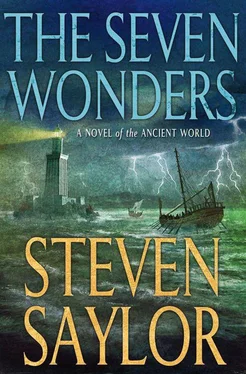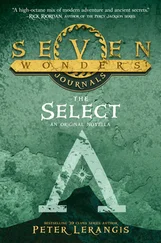Steven Saylor - The Seven Wonders
Здесь есть возможность читать онлайн «Steven Saylor - The Seven Wonders» весь текст электронной книги совершенно бесплатно (целиком полную версию без сокращений). В некоторых случаях можно слушать аудио, скачать через торрент в формате fb2 и присутствует краткое содержание. Год выпуска: 2012, Издательство: Macmillan, Жанр: Исторический детектив, на английском языке. Описание произведения, (предисловие) а так же отзывы посетителей доступны на портале библиотеки ЛибКат.
- Название:The Seven Wonders
- Автор:
- Издательство:Macmillan
- Жанр:
- Год:2012
- ISBN:нет данных
- Рейтинг книги:4 / 5. Голосов: 1
-
Избранное:Добавить в избранное
- Отзывы:
-
Ваша оценка:
- 80
- 1
- 2
- 3
- 4
- 5
The Seven Wonders: краткое содержание, описание и аннотация
Предлагаем к чтению аннотацию, описание, краткое содержание или предисловие (зависит от того, что написал сам автор книги «The Seven Wonders»). Если вы не нашли необходимую информацию о книге — напишите в комментариях, мы постараемся отыскать её.
The Seven Wonders — читать онлайн бесплатно полную книгу (весь текст) целиком
Ниже представлен текст книги, разбитый по страницам. Система сохранения места последней прочитанной страницы, позволяет с удобством читать онлайн бесплатно книгу «The Seven Wonders», без необходимости каждый раз заново искать на чём Вы остановились. Поставьте закладку, и сможете в любой момент перейти на страницу, на которой закончили чтение.
Интервал:
Закладка:
Marcus rejoined the others in the gruesome task of moving the dead bodies.
* * *
Even though we had told him all we knew, Menenius would not allow Antipater and me to move on until the inquest took place. The driver refused to stay any longer, and headed home to Olympia with his wagon early the next morning.
There could hardly have been a more boring place to get stuck. A full day exploring the ruins of Corinth had been quite enough for me. Lechaeum itself had little to offer beyond the tavern, which I could no longer enter without becoming nauseated. The dusty, sparsely stocked little shops clustered around the garrison offered nothing to tempt me; nor did the brothel on the waterfront, to judge by the haggard women I saw coming and going by the back entrance.
On the bright side, it appeared that the inquest would be held in short order. Things did not look good for Ismene, the serving woman at the tavern. A search of her little hut turned up materials used in witchcraft-the same types of lamps, incense burners, and blank lead tablets that Antipater and I had discovered in the witch’s den on the Slope of Sisyphus, along with small lead boxes containing wooden dolls, which according to Antipater could also be used to cast spells. Obviously, Ismene was a witch, and presumably had written the curse tablet discovered in the tavern-but she was nowhere to be found. The soldiers searched every house in the vicinity and questioned all the locals. Ismene had vanished into thin air.
According to Gnaeus, the locals all agreed that witchcraft had killed the Romans. Absent evidence to the contrary, it seemed that the commander was prepared to go along with this idea.
“Do we really believe all those men were killed by a curse?” I asked Antipater. We were sitting under the shade of a fig tree outside the inn, enduring the heat of the day along with the dogs lying in the dust nearby.
“You read the tablet yourself, Gordianus. It called upon the forces of necessity and fate, as well as this Egyptian Ufer, whoever he is, to ‘open their throats.’ Isn’t that exactly what happened-in the middle of the night, with no resistance from the victims, and so quietly that neither you nor I was awakened? That sounds like witchcraft to me.” Antipater shuddered. “What’s that in your hand?”
Absentmindedly, I had pulled out the little figure of Hercules I had taken from Marcus and was fiddling with it. There was no use trying to hide it, so I explained to Antipater how I came to have it.
“I’ve been thinking I should give it to the commander, to be restored to Tullius’s property, but it’s awkward. If I tell him Marcus took it, he’ll probably be flogged, or worse. But if I don’t tell the commander the truth, he may think I stole it myself. If I say I simply found it, how do I explain that I know it belonged to Tullius?”
“Are you certain it was his?”
“It came from his coin purse.”
“Let me have a closer look.” Antipater examined the figure under a patch of sunlight. “This is Corinthian. The city’s bronze workers were famous for making miniatures like this. Do you see the mottled surface, dark red and green? That’s a special patina they developed, which is seen in no other bronze sculpture. And here, this stamp on the bottom-that’s the sign of one of the most famous Corinthian workshops.”
“Tullius was such a show-off, you’d think he would have shown his Corinthian good luck charm to everyone.”
Antipater frowned. “Do you know what I think? Tullius didn’t bring this with him from Rome. I think he found it amid the ruins the other day, and filched it.”
“I’m not sure ‘filch’ would be the proper word. After all, if he found it, fair and square-”
“He had no right to take it. By decree of the Roman Senate, nothing can be built within a certain radius of the ruins of Corinth. Nor can anything be taken out. Nothing in, nothing out. There is to be no commerce of any sort, and that includes treasure hunting. Of course, one presumes there’s no treasure left, that everything of value was long ago looted or destroyed. But perhaps under all the dirt and rubble, a few precious items might yet remain-like this figurine. That would make this object quite rare-probably worth a legionnaire’s salary for a year.”
“This little thing? You’re joking!”
Antipater looked up and down the street. “Perhaps I exaggerate. Nonetheless, I’d tuck that away, if I were you. And I’d keep my eyes peeled for Marcus. I wouldn’t put it past that fellow to knock you over the head and take it back from you.”
The day grew warmer still. Antipater fell fast asleep. I found myself looking at the craggy face of Acrocorinth in the distance, and felt a sudden impulse to return there. We had lost the wagon driver, but without Antipater to slow me down, I decided I was perfectly capable of walking there and back. I rose to my feet and headed out, shooing the dogs to keep them from following.
The sunlight was blinding. Waves of heat rose from hillsides covered with dry, brittle grass. I quickly grew thirsty, and realized I should have brought some water with me.
I reached the line of the ruined city walls, and pressed on. I found the spot where we had run into Tullius and his party, and from there, I tried to determine where I had last seen them when I gazed down from the summit of Acrocorinth. Heat and thirst made me light-headed. The piles of rubble all looked alike. I became disoriented and confused. I began to see phantom movements from the corners of my eyes, and the least sound-the scrambling of a lizard or the call of a bird-startled me. I thought of the mother who had killed her daughter and then herself, and all the countless others who had suffered and died. I felt the ghosts of Corinth watching me, and whispered words to placate the dead, asking forgiveness for my trespass.
At length, I stumbled upon an area that had recently been disturbed. Overturned rocks exposed the worm trails beneath, and clods of earth had been dug up. Some instinct led me to move a particular stone, and behind it I discovered a narrow defile, just large enough for a man to stick his arm inside.
The idea that a snake or a spider or something even more terrible might live in such a crack gave me pause. I took a deep breath, then reached into the dark hole.
My fingers touched something cold and scaly, and I heard a slithering noise. I drew back my hand, then had a glimmer of realization. I reached inside again and felt my hand immersed amid bits of smooth, cold metal. I trapped one of the coins between my forefinger and thumb and pulled it out.
The silver was tarnished almost black, but the images were so finely cast that I could easily make out Bellerophon astride his winged horse, Pegasus. On the reverse was an image of the monstrous Chimera slain by the Corinthian hero. The coin was thick and heavy in my hand.
I became so lost in studying the images that I didn’t hear the approach of the horse and rider. When their shadow fell on me, I looked up, startled. The sun formed a blinding halo around the soldier’s gleaming helmet.
“Beautiful, isn’t it?” said Marcus. “The coin, I mean. It’s a funny thing, how some objects are beautiful because they’re one of a kind-like that figure of Hercules you took from me. But coins become more beautiful the more of them there are. And there are a great many in that little hiding place you’ve discovered. It took me months to dig up those coins, along with all the other treasures I’ve found amid the ruins.”
“Treasures?” I said, my mouth dry.
“Vases and such. A lot of the things I find are broken to bits, or melted by the flames, but every so often I find something so perfect I can hardly believe it. Like that little figurine of Hercules that Tullius found yesterday and dared to slip into his coin purse. From what I overheard, he and his friends agreed ahead of time to split anything they found evenly between them, and when they found this particular cache of treasures, they agreed to leave it intact and come back for it later. That was naughty of Tullius, to slip the Hercules into his coin purse while the others weren’t watching. What if Menenius had come across it while searching the dead bodies, and realized where it came from?”
Читать дальшеИнтервал:
Закладка:
Похожие книги на «The Seven Wonders»
Представляем Вашему вниманию похожие книги на «The Seven Wonders» списком для выбора. Мы отобрали схожую по названию и смыслу литературу в надежде предоставить читателям больше вариантов отыскать новые, интересные, ещё непрочитанные произведения.
Обсуждение, отзывы о книге «The Seven Wonders» и просто собственные мнения читателей. Оставьте ваши комментарии, напишите, что Вы думаете о произведении, его смысле или главных героях. Укажите что конкретно понравилось, а что нет, и почему Вы так считаете.










